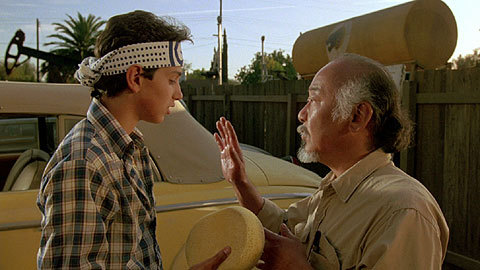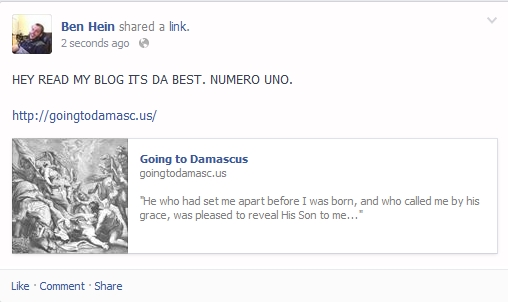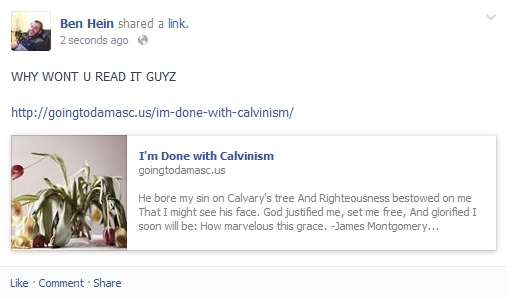I recently gave one of the most shaping books for my Christian walk – Tim Keller’s The Prodigal God – to my father for his birthday. This book is a short but powerful exposition of the Parable of the Two Brothers from Luke 15:11-32. As I was flipping through the pages and remembering how fond I was of this book, I was struck by one paragraph that I came across at the end of the first chapter. When comparing the difference between the disobedient younger brother and the moralistic, in-it-for-himself elder brother, author Tim Keller writes this:
“Jesus’ teaching consistently attracted the irreligious while offending the Bible-believing, religious people of his day. However, in the main, our churches today do not have this effect…That can only mean one thing. If the preaching of our ministers and the practice of our parishioners do not have the same effect on people that Jesus had, then we must not be declaring the same message that Jesus did. If our churches aren’t appealing to younger brothers, they must be more full of elder brothers than we’d like to think.” (Keller, 15-16)
The climate of the Western Church over the last two centuries has tried two great experiments. The first is the desire to make everything relevant in the church. Exegete and preach the Word, sure, but exegeting and preaching the culture instead is what attracts people, right? On paper, these dear brothers and sisters would still hold to an orthodox Christian faith, but their practice looks much different. A watered-down gospel is preached which lacks the conviction of sin and the grace of our Savior, all-the-while flooding congregants with bright lights and showering them with comfort.
The second experiment has been to reject traditional Christian teachings. If the “dogmatic” authority of the Bible is rejected, if the traditional ethical teachings of Jesus are ignored, if the historic creeds and confessions of the Church are disregarded, then we offer people to come to Christ and stay as they are. If we make Christianity easier for people – so they say – then more people will be attracted to Christ. Yet, these mainline churches are dying just as fast, if not faster, as the first group. There is no gospel-driven power to change in this proclamation. What is sold in these churches is no different than what the world is selling – except the world sells it for much cheaper.
And what is the result of such experimentation? I think author and scholar David Wells puts it best:
“Today, in the evangelical church, there are apparently many who have made decisions for Christ, who claim to be reborn, but who give little evidence of their claimed relationship to Christ. Something is seriously amiss if, as George Barna has reported, only 9 percent of those claiming rebirth have even a minimal knowledge of the Bible, if there are no discernible differences in how they live as compared with secularists, and if the born-again are dropping out of church attendance in droves. If these numbers are anywhere close to being accurate, then the gospel has become a stand-alone thing, and many who say they have embraced it have never entered the Christian life to which it was supposed to be the entry point.” (David F. Wells, God in the Whirlwind: How the Holy-Love of God Reorients Our World, 158)
This dilemma is one area where the teachings and emphasis of the saints of our past can greatly correct and aid us. Orthodox Christianity has always emphasized three important aspects to a saving faith, which come from the earthly ministry of Jesus Christ given to us through his Word:
- Knowledge: We need to know rightly who Christ is, that he alone has the power to save (John 14:6). We need to know and understand that he alone takes away the sin of the world (John 1:29), that he alone is the eternal begotten Son of the Father sent into the world to save sinners (Isaiah 49:6, John 1:1, Mark 2:17, Mark 10:45). If we say we believe in Jesus but do not understand rightly who he is, that is not faith; it’s idolatry.
- Conviction: It is necessary that we be convicted of our sin. We must understand that faith and repentance go hand in hand (Matthew 4:17). We as sinners must know rightly that we are indeed sinners and where that places us before a Holy God. We must be convicted that Christ knows what to do with our sin when we come to him (John 6:68).
- Trust: Every fiber of our being must places its trust in the grace of Christ and not in our own moralism (John 1:17, Luke 24:47). We must transfer the trust from ourselves and our efforts to earn anything to the once-and-for-all work of the blood-stained Savior.
Both the elder brother and the younger brother knew who their father was (Luke 15:12). Yet, it was the prodigal younger brother who was convicted (Luke 15:17-19) and then trusted (Luke 15:20-24) in his father, which led to the great feast at the prodigals homecoming. The elder brother was never convicted of his dependance on his father and therefore never trusted him, and it is for this reason he remained outside of the great banquet. Despite his good works and high sense of morals, the elder brother never came in to the feast. If we want to see more prodigals come home and more moralistic church attenders come to the banquet, then we must present and live out a holistic gospel.
Church, let us press in to be faithful to the God who has called us home to the banquet feast.
I was raised in a progressive Lutheran home. In my late teens and early 20’s, I found myself in the angry-atheist and apathetic universalist camp. From there, I became a believing Christian in a Non-Denominational church, and now I’m a Baptist who studies at a Presbyterian seminary. What does that mean for me? That means, more often than not, I find myself counted among “The Others.”
How do you know when you too are a part of The Others?
When you realize that most problems could be solved with a both/and answer and not an either/or.
When you realize that the American church has just as much indivualistic selfism as the culture surrounding it, and the answer to this problem might lie in appreciating, recognizing and understanding the church and saints of history past…
…but that doesn’t mean glorifying the past, either.
When you realize that you’re too conservative for the progressives and too progressives for the conservatives…
…because maybe we can all agree that regardless of your stance on marriage, being bullied, discriminated in the work force, or pressured into depression and suicide for your sexuality is wrong?
…because even if you count yourself among the feminist crowd, maybe you can agree that its harmful to your ideals to be a part of a society where women are dropped off at abortion clinics by their fathers, husbands and boyfriends who are forcing them to kill their daughters simply because its inconvenient?
…because maybe we can all agree, regardless of your stance on global warming, that we have a mandate by our Creator to be good stewards over his creation?
…because maybe we can agree that attempting change for the benefit of society is better than watching a bunch of out-of-touch politicians debate without getting anything done?
…because true tolerance and societal flourishing will only happen when all views are equally welcomed at the inter-religious/inter-cultural table, not just the ones who agree with you.
…because you realize that the first time Christ came he tore apart the conservative Pharisees and the progressive Greco-Roman Empire, and he’ll do the same thing when he comes again.
When you realize that asking the right questions might be met with a wrong response.
When you realize that being unpopular is better than setting aside your convictions.
When you know that faith and science agree on far more than they disagree on…
…and asking good questions in this area doesn’t make you a heretic.
When you reject anything that looks like post-modern thought, but you realize that those who hold to it aren’t the enemy, they’re the lost.
When you realize that having a 100% commitment to the advancement of the gospel means having a 100% commitment to meeting social needs and justice.
When you realize that you’ve become too catholic for the evangelicals and too evangelical for the Catholics…
…because maybe there is something wrong with the glamorous mega-church evanjellyfish rockstar churchianity prominent in today’s culture, regardless of how comfortable you are or how much you don’t want to admit it.
…because you realize that having a strong commitment to understanding the Word of God through the guidance of the Spirit means we can’t reject what the Spirit has taught the church for the last two-thousand years.
…because you realize that strong theological commitments aren’t just a fight over opinions, but over what gives the most glory to God in the way he has revealed his holiness requires and deserves.
…because you realize that individualism in the church is a destructive cancer.
…because no matter what your strong theological commitments are, they can’t hinder the advancement of the gospel.
…because you realize that “this is what this means to me” theology isn’t how Christ intends to build his church.
…because you realize that holding fast to doctrine necessarily means excluding false teachers from the church.
…because holding fast to doctrine doesn’t mean you can exclude love and humility.
…because you realize that the answer to bloated hierarchy isn’t to have no hierarchy at all.
…because desiring a strong commitment to creeds and confessions in their proper place strengthens the power of the Word, it does not detract from it.
…because holding a complementarian view of the Scriptures must mean fighting male chauvinism and elitism at every turn.
…because holding fast to orthodoxy doesn’t mean being unwilling to ask questions about what is popularly taught and understood.
When you realize you need to listen more than you need to speak.
When you often feel like the loudest voices don’t speak for you.
When you realize following Christ means you probably won’t fit into any mold that the church or pop-culture around you wants to put you in.
When you find yourself thinking these kinds of thoughts, you too might be counted among The Others.
Out of the great 1980’s movie era came what is widely regarded as one of the most iconic films in movie history, The Karate Kid. In this film, the protagonist Daniel-San is perpetually bullied and beat up by the Karate students of the Cobra Kai dojo until the wise sage and Karate master Mr. Miyagi steps in and saves him. Eventually, Mr. Miyagi reluctantly agrees to teach Daniel-San Karate in order to beat the Cobra Kai bullies in a local Karate tournament.
Unbeknownst to Daniel-San, Mr. Miyagi begins teaching him Karate through regular household chores; waxing Miyagi’s car, painting his house and fence, and sanding his wooden deck. Of course without the end result in mind, to Daniel-San this is nothing more than being an errand boy in a feeble attempt to earn Mr. Miyagi’s time so he’ll teach him real Karate. This only lasts for four days, until finally Daniel-San has had enough with the chores and furiously decides its time to go home.
“Daniel-San!” exclaims Mr. Miyagi. “Come here!”
As a martial artist myself, I love what follows in this scene between these two characters. Mr. Miyagi begins to unfold what his plan has been all along. “Sand the floor” is not simply a technique Daniel-San learns to make a deck look nice, but to block kicks coming at his midsection. “Paint the fence” is not only the proper technique for exterior remodeling, but for blocking high and low punches as well. “Wax on, wax off” is another way of saying, “Use correct technique or you’re going to get punched in the face.”
Daniel-San finally gets it; he’d been learning Karate all along.
Sometimes I feel like my attempts at learning theology are much like Daniel-San’s approach to learning karate. I don’t want to know application and wisdom, I just want to know facts and answers. My pride gets in the way and turns theology into an intellectual pursuit rather than worship. It is all too easy for me to turn my studies of the Scriptures into an attempt to tear down other peoples philosophies and worldviews, completely neglecting the fact that I’m supposed to be drawing closer to the holy and loving God of the entire universe. In haste, I determine that people who aren’t teaching me enough facts aren’t teaching me enough “theology.” After all, in order to be the best around you have to know more than everyone else, right?
Take for example when I started my Islam class a couple years ago. I went into the class wanting a five-point systematic discourse on how to tear apart Muslim apologists. Instead, I learned that if I don’t actually love people, I have no business engaging in evangelistic dialogue – regardless of how much I know.
Wax on, wax off. Paint the fence, Ben-San.
When I first became a Christian and the majesties of God were opened to me, I bought every apologetic resource I could find hoping to prove to my friends why I was right and they were wrong. I had no conception that a right understanding of God should only lead me to a correct worship of God.
Wax on, wax off. Paint the fence, Ben-San.
I think about how often I go into a sermon on Sunday simply looking for new nuggets of information and knowledge, rather than a desire to draw near to the throne of grace through the preaching of God’s Word. Instead of setting myself at the foot of the cross, seeking to have the Word of God pierce my heart, I elevate myself to a place where I feel worthy of picking apart good or bad facts.
Wax on, wax off. Paint the fence, Ben-San.
After every one of these examples, I had a moment where I realized that my original desires weren’t for real theology, but something entirely different. Every time my knowledge and pride puffs me up, like a crane kick to the face I get knocked down and realize I don’t know real theology at all.
The truth is, more often then not I act like one of the antagonist students from Cobra Kai than I do a protege of Mr. Miyagi. My goal is to show no mercy, sweeping the leg of my opponents and humiliating them at whatever cost. Oh Lord, shape my study of you to lead towards praise of you! It has been said that a right theology leads to proper doxology. May my life be evidenced not by how much I know, but by the magnitude of the God I worship. He must increase, but I must decrease.
Being the best around isn’t about how much you know, but instead is defined by being united to a compassionate and loving God through the sacrifice of Christ, as evidenced by your kindness and goodness towards other people. Being the best around means realizing that Christ is Lord over all, and that I am the least of these worthy to be called one of his own.








